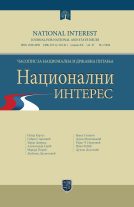- Home page
- Researchers
- Zoran R. Pešić
Zoran R. Pešić
Faculty for business studies and law, University „Union-Nikola Tesla”, Belgrade

ARE MORAL VALUES IMPORTANT? PRESIDENTS AND FOREIGN POLICY FROM FDR TO TRUMP
Review of the book by Joseph Nye Do Morals Matter? Presidents and Foreign Policy from FDR to Trump / Joseph S. Nye, Jr. - New York>Oxford University Press, 2020

INTERNATIONAL RELATIONS AND COVID – 19
The author of this paper chooses the theme of international relations caused by the pandemic COVID - 19 with the aim to point out the vitality and primacy of the neorealist theoretical paradigm in relation to the neoliberal one. After the introduction, the paper discusses the theoretical foundations of the realistic and liberal theory of international relations and analyses international relations from a neorealist perspective. International relations were analysed from the aspect of the international system, individuals and states which are considered to be an integral part of the process. In addition, a brief overview of Serbia and its foreign policy during the pandemic crisis is provided in the text. The following methods were used in the paper: descriptive, analytical and synthetic. It was stated in the conclusion that the realistic vision of international relations was confirmed by the current situation caused by the crisis with the following facts: in international relations, the same interests prevail, and that is the survival of states; the international system is unable to cope with a pandemic in the way that neoliberals see it; self-help is the most important but not the only way to fight for survival; states are reaffirmed as the most important and even stronger subject of international relations; human nature is also stripped and transposed to states in such a way that solidarity is much less represented and selfishness is declared as an interest; the great powers deepened their disagreements, turned to strengthening their own power in order to maintain their own status, or with the idea of gaining an advantage in some other constellation of forces, and so on. Serbia has been in different focuses in international relations due to certain foreign policy actions, and time will show how it will affect Serbia’s position in the international relations. At the same time, the current outcome of the contention between these two theoretical paradigms in the context of the future existence of all factors in international relations, and consequently the best possible relations, is problematized. The current crisis may provoke the same response in the future, and that is focusing on national interests, then exploiting the fact that strong, disciplined and authoritarian states have dealt more easily with the pandemic through the declaring states of emergency, limiting human freedom, restrictions for those who are both inside and out of those countries. This means that authoritarian systems can have a greater influence in the international system by imposing similar models and methods of governance, because they were arguably more prepared to deal with the crisis. However, the COVID-19 virus can be a catalyst for many changes and redefining the roles of politicians and political institutions, primarily the executive branch, as well as relations between countries and the building of international mechanisms and institutions. It is paradoxical, but the neorealist victory is of limited scope, because the international system, states and individuals can survive only if they strengthen integrative processes and awareness of unity, which is not only a hypothetical goal, but also the need of all.

